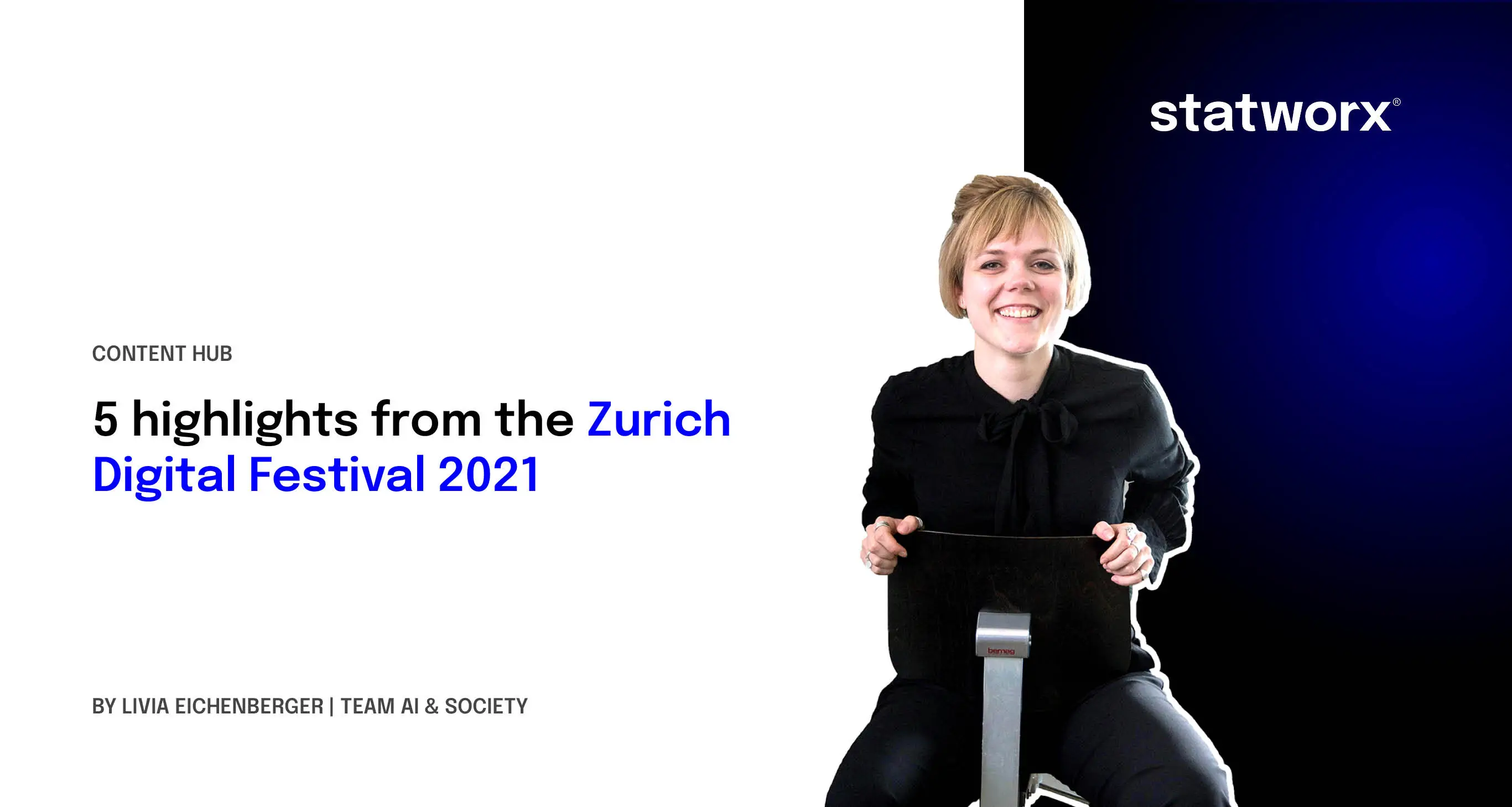5 highlights from the Zurich Digital Festival 2021


Last year, the entire Swiss team from STATWORX attended for the first time at Digital Festival Zurich while doing so. That's why we were really looking forward to this year's event, which took place from September 23 to 26 in the shipbuilding sector in Zurich, which is conveniently just around the corner from our Swiss office. Under the motto “Make It Personal,” a variety of keynotes, labs and networking sessions brought together digital leaders, digital aficionados and innovators, all driven by curiosity, openness and a maker mentality. In keeping with this year's motto of the Digital Festival, I don't want to withhold from you my personal five highlights of this event.
5 highlights from the Zurich Digital Festival 2021
1. AI Experience: Learn. Interact Apply
This year, we not only attended the Zurich Digital Festival as guests, but also had the opportunity to host a lab session on Friday afternoon. In our AI Experience Lab, we first gave a brief introduction to what is behind the buzzword artificial intelligence and offered the opportunity to interact and play around with various AI applications. For example, with a GPT-3-based data science chatbot or Google's Teachable Machine.
After presenting various use cases of the presented AI technologies, the participants were able to develop further use cases for their respective business area. Since we were given the chance to organize a lab session quite spontaneously, we were all the more pleased that it was immediately booked out. The group was very heterogeneous — business people from various industries, researchers and also a few students — which led to many interesting conversations and discussions. It was a great pleasure to see how interested and engaged the participants were.
In the final round of questions, they primarily wanted to know what AI will look like in the future and what effects it will have on society. This has once again shown me how important it is not only to focus on AI in business, but also to address and promote topics in the area of AI and society.

2. Blind Spot — The game for your next team event
In addition to our own session, I also took part in another lab session, and it was a hit. In this lab, we had the opportunity to play Blind Spot. Blind Spot is a cooperative board game that was researched and developed by Sabrina Schenardi and Matthias Koller with the support of game developer Robert Stoop as part of an MBA thesis.
In teams, we were responsible for managing a fictitious company with all usual departments such as HR, Finance or IT. With speed, strategy and collaboration, we had to overcome various challenges and resolve conflicting goals. It took some time for our team to get used to the idea of playing together and not against each other. It was also very interesting to see that each of us had a different idea of what winning meant in this game: While some of us wanted to have as much money in our account as possible, others wanted to avoid falling into a blind spot at all costs (a situation in which you have to solve an enormous number of tasks). And then there were those who simply wanted to finish the game faster than the other teams.
In the final discussion, after all teams had finished the game, we realized that none of us was more right or wrong than the others. Just as in the real world of business, there are many different strategies and measures to successfully manage a company.
3. Festival atmosphere everywhere
What I really like about Digital Festival Zürich compared to other business and networking conferences is the exceptional venue and relaxed atmosphere of this event. As soon as I checked in, the badges and festival wristbands reminded me more of my visit to the Gurtenfestival a few years ago than of my last visit to a business conference. Just that the check-in here was much faster than at any music festival I've ever visited. This festival feeling ran throughout the event and fully justified the name Digital Festival.
The foyer was filled with various food trucks, adventure stands and sitting areas for chatting. The entire main venue was designed to be very open and flexible, so you could easily switch between keynote speeches, networking and catering without disturbing anyone. In general, the venue was perfectly tailored to the topic of digitization. The shipbuilding, which was originally used to build ships, is located in the heart of Zurich's tech district, right next to the famous Technopark. The industrial style of the building combined with the modern, avant-garde decoration provided the perfect environment for innovations, ideas and discussions on topics of our digital future.

4. What a culinary experience!
The icing on the cake of this event was definitely the catering. After checking in, we were greeted with croissants, fresh juices and smoothies and — best of all for a frahling enthusiast like me — a barista truck with freshly roasted coffee. For lunch, the lobby was full of food trucks offering everything your heart could desire: curries, pasta, work, sushi, burgers and more — all super fresh and delicious. And the best thing about it: Since the portions were closer to tapas size, you could try everything without wasting food. There were also plenty of vegetarian and vegan options, so there really was something for everyone. My personal favorite: the vegetarian gnocci with cream, spinach and walnuts. For dessert, we were able to treat ourselves to sweet ice cream from the region. After the afternoon lab sessions, we were offered a delicious aperitif with delicacies such as mussels, white wine risotto and cocktail meatballs. Together with local beer and wine, this was the perfect culinary end to this event.
5. Keynote: AI for decision making?
My personal highlight at the Digital Festival was Elliott Ash's keynote on the topic Building a Robot Judge - What Role for Artificial Intelligence in Judicial Decision-Making. Based on the idea of building a robotic judge, Elliott Ash addressed the question of when AI should be used to support human decision-making. To answer this question, he presented three categories of decision-making processes and the associated opportunities and risks of using AI in each of these processes. Overall, the biggest risks of integrating AI into decision-making processes are likely to be prejudice and discrimination. Since prejudice is a very complex issue in AI, there are still no perfect solutions to this problem. However, there are ways in which AI can be used to identify biases in systems and even in people.
In connection with developing fair algorithms, Eliott Ash raised another very interesting and important question: Which reference point do we use to measure the fairness and transparency of AI systems? In all the discussions about AI fairness, we often forget that we humans are very biased and inconsistent ourselves. In fact, AI systems are only biased because they are trained with human data and developed and evaluated by us. He also pointed out that prejudice in AI often occurs when a sensitive characteristic, such as skin color, is used as a substitute for another missing characteristic.
Without going into detail here, this once again showed me how important it is to advance the area of causal machine learning in order to develop AI systems with causal thinking, as these systems would automatically solve the proxy problem and are overall more robust than current AI solutions.
Finally, I would like to thank Elliott Ash for this great keynote, which combined all my personal interests around AI — bias, ethics, people, and causality — and gave me lots of new ideas and thoughts on these topics.
Conclusion
After participating in Digital Festival Zurich last year, we had high expectations for this year's Digital Festival, and we were not disappointed. When possible, this year's edition was even better.
In addition to my five highlights mentioned above, I really appreciated all the interesting people I met — old friends and new acquaintances — and the inspiring discussions with them. I was also very happy that I was able to spend a whole day with my Swiss teammates, because due to the corona pandemic, this was no longer possible for a long time.
Finally, I would like to thank all organizers of the Digital Festival for hosting this event and all participants for their ideas, inputs and positive energy. We are already looking forward to the 2022 Digital Festival!






